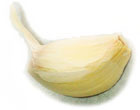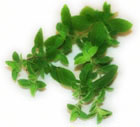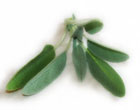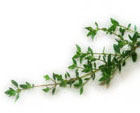Recipe
GOODNESS
 Garlic:
Garlic is in the same family as onions and leeks, and purportedly provided ancient Roman soldiers the courage to battle the barbarians.
Whether or not it gives you courage, it is known to lower blood pressure, which is great for your heart and helps prevent stroke.
In addition, it has a long history as a digestive aid, so don't be shy with this wonderful herb, no matter what it does to your breath!
Garlic:
Garlic is in the same family as onions and leeks, and purportedly provided ancient Roman soldiers the courage to battle the barbarians.
Whether or not it gives you courage, it is known to lower blood pressure, which is great for your heart and helps prevent stroke.
In addition, it has a long history as a digestive aid, so don't be shy with this wonderful herb, no matter what it does to your breath! |
 Oregano:
This tasty herb finds itself in much Mediterranean cooking, and is just loaded with nutrients. It is good for the digestion, and has many powerful anti-oxidants (even more than blueberries) and anti-carcinogens. It also has antibacterial and antiparasitic properties. As if that weren't enough, is also an antifungal, even taking on the notorious candida yeast. You want to use fresh oregano, as the dried herb loses the volatile oils that are responsible for its many benefits.
Oregano:
This tasty herb finds itself in much Mediterranean cooking, and is just loaded with nutrients. It is good for the digestion, and has many powerful anti-oxidants (even more than blueberries) and anti-carcinogens. It also has antibacterial and antiparasitic properties. As if that weren't enough, is also an antifungal, even taking on the notorious candida yeast. You want to use fresh oregano, as the dried herb loses the volatile oils that are responsible for its many benefits. |
 Sage:
This delightful herb is a key player in some terrific recipes, but it is also a great purifier, fighting both bacteria and viruses. It is a powerful anti-inflammatory, and is used by many to ease the symptoms of arthritis. It also helps to lower blood pressure and control blood sugar. Like rosemary, it has been used since ancient times as a memory enhancer. Although it is just fine in foods, you should avoid excessive quantities of sage if you are pregnant.
Sage:
This delightful herb is a key player in some terrific recipes, but it is also a great purifier, fighting both bacteria and viruses. It is a powerful anti-inflammatory, and is used by many to ease the symptoms of arthritis. It also helps to lower blood pressure and control blood sugar. Like rosemary, it has been used since ancient times as a memory enhancer. Although it is just fine in foods, you should avoid excessive quantities of sage if you are pregnant. |
 Thyme:
This aromatic herb has anti-inflammatory and anti-oxidant properties and contains thymol, a well-known antiseptic (you might be gargling with it). It's good for the digestion and is supposed to have some aphrodisiac qualities, although that just may be be due to the well-known connection between love and good food.
Thyme:
This aromatic herb has anti-inflammatory and anti-oxidant properties and contains thymol, a well-known antiseptic (you might be gargling with it). It's good for the digestion and is supposed to have some aphrodisiac qualities, although that just may be be due to the well-known connection between love and good food. |
ADVERTISEMENT
Help • Site Map • About Us • Contact Us • Privacy Policy • Press Center
Spice Plan™ Copyright © 2009 by Scott Charles Anderson. All rights reserved.